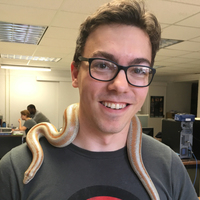PeerJ Communities Presents ‘Advice to My Younger Self – 5 Tips for Early Career Researchers’ an ongoing series to share advice and life lessons for Early Career Researchers from fellow researchers.
We invited Brandon P. Hedrick Ph.D. Assistant Professor of Anatomy, Louisiana State University New Orleans to share his thoughts.
This is an ongoing blog series so keep an eye on the PeerJ blog to see more advice from our Editorial and Advisory Board Members. If you would like to contribute to the series please do get in touch: communities@peerj.com

I am an evolutionary biologist and ecologist interested in how morphological innovations can lead to the radiation of taxa and ultimately the diversity of life we have today. I study morphological evolution across the vertebrate tree, working on fish, amphibians, reptiles, birds, and mammals, including extinct and extant taxa. I am currently an early career researcher myself, working at LSU in New Orleans, and the following tips are things that I have found work well for me, that will hopefully also be helpful to other early career researchers, particularly postdocs.
1. Frame your research question in the largest context possible
Ensure that your research focuses on a big question that is interesting to a broad scope of researchers and funding agencies rather than on a narrow (albeit interesting) subtopic. This can make your papers more impactful, increase the likelihood of receiving funding to pursue additional questions on that topic, and likely generate more citations, since your research will be relevant to a larger number of scientists. Even the narrowest of subtopics connect to a big question in your field and sometimes all you need to do is frame the relatively narrow question in which you are interested in terms of that big question.
2. Mentor students of different levels
If you are interested in pursuing a career at a university, it is very likely that teaching will be a major component of your work. Teaching and research are reciprocal, in that learning to be a better teacher gives you experience explaining your research program, while doing research gives you a depth of knowledge that you can draw on in your teaching that you might not otherwise have. By teaching students of different levels (undergraduates, master’s students, Ph.D. students, postdocs), your students will also learn how to teach one another, granting them a better lab experience. Additionally, this will allow you to learn how to explain topics to people with a variety of backgrounds and knowledge bases in your field.
3. Schedule your research projects in the near and long term
To keep track of projects, it helps to keep a master list of all of the projects that you are working on and their general progress (e.g., data collection, writing, in review). Additionally, it is helpful to keep a weekly schedule of goals. Especially when you have a high teaching load or a large lab, it is very helpful to keep track of short-term research, teaching, and service goals to make sure you don’t fall behind on any fronts.
4. Meet people and grow your network
Although networking is often touted as one of the most important aspects of early career anything (including early career researcher), many people tend to neglect it. There is a maximum amount of work that any early career researcher is capable of doing alone, especially when they are being pulled in many different directions. Simply by contacting other researchers who you would like to work with, especially local researchers, you can build a large network of collaborators and increase your productivity tremendously as well as get your name out in the scientific community. This can be done at conferences or via email outside of conference time. If you would like to meet someone at a conference and talk about a potential collaboration, email them before the conference and ask if they’re able to meet for brunch of lunch on one of the conference days. It is very tough to schedule meetings once you’re there, especially with someone you don’t know.
5. Apply to as many grants as possible
Getting grants is the lifeblood of doing research. There are numerous opportunities out there to apply, but the odds of any particular grant being funded is low. By writing 2-3 large grants a year, you will tremendously increase your chances of successfully receiving funding and being able to continue to fund and pursue your research. Making a large list of available grants and planning early is key to successfully producing and submitting high-quality grants in time for their deadlines. Setting personal deadlines for grants with rolling applications is also very helpful.

